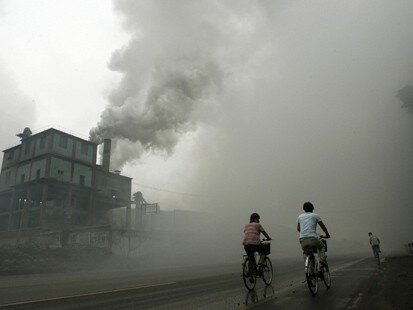Last week, researchers at MIT made a startling announcement: the impact of air pollution in China was estimated at $112 billion in 2005 alone! These increased costs come from, as the USA Today put it, “both lost labor and the increased need for health care because ozone and particulates in air can cause respiratory and cardiovascular diseases.” To put that into a bit of perspective, Yanzhong Huang at the Council on Foreign Relations notes that between 2009 and 2011, the Chinese government put a total of $27 billion into the healthcare sector.
We have previously pointed out from Yanzhong Huang’s Foreign Affairs article, “The Sick Man of Asia”, that Beijing’s focus on economic growth has come at the expense of larger questions about the impact of this growth on the country’s environment, healthcare, and matters of inequality. This part of his article seems especially relevant given last week’s announcement from MIT:
“Despite the seriousness of these issues, in their single-minded pursuit of economic growth, China’s leaders have long overlooked public health. After the Maoist health-care system began to collapse in the early 1980s, government spending on health as a share of gdp declined, from about 1.1 percent in 1980 to about 0.8 percent in 2002. (In 2002, U.S. government spending on health accounted for 6.7 percent of gdp.) The introduction of market-oriented reforms in the 1980s further hurt an already debilitated health-care system: by 2003, more than 70 percent of China’s population had no health insurance at all. There have been some reforms since, but China’s disease burden continues to grow—threatening the country’s health-care system, the economy at large, and even the stability of the regime.”
China presents one of the most interesting and impactful experiences the world has ever seen relative to the velocity with which countries can modernize. In ages past, our manufacturing technology was not so easily transplanted, nor were the mechanisms we used to disperse technologies around the globe fast enough, to present the world with the question of what would happen when a backwards country modernized its economy as quickly as China has. While we can shake our heads at the environmental and health damages being done in China (and around the world for that matter), the question remains to be answered: how else would China have modernized its economy if not in this way? Is there adequate international governance in place to somehow govern the speed with which a country as large as China, with as few environmental regulations in place as the country does, brings its economy forward through rapid industrialization? While the burden of China’s modernization on the environment is felt most acutely by the Chinese, it also has a global impact on the health of everyone. Consequently, it seems the burden to monitor and manage an under-developed nation’s industrialization has to incorporate the role developed nations play in adding fuel to the fire as these undeveloped countries move forward.
For China, the rapid economic growth has come at a cost, and if the MIT study is right, the actual expense related to China’s environmental damage is much greater than the amount of money Beijing has allocated to public healthcare. This is obviously a great opportunity for pharma, medical device, and healthcare service providers to bridge the gap, but it also speaks to the ultimate conundrum that Beijing must face: can it afford to grow as quickly as it has, and if it cannot, what is “Plan B”? Issues of environmental degradation, lack of healthcare, and overall spreading income inequality are all issues that China will ultimately have better manage if it is to grow into the dominant economic power many today assume is all but inevitable.


[...] Over at AsiaHealthcareBlog, I have a quick review of last week’s announcement from MIT that the cumulative impact of environmental problems on China’s healthcare was $112 billion in 2005. Compare that to the country’s cumulative spending on healthcare last year ($27 billion), and you start to see why healthcare remains one of the most pressing needs and compelling opportunities in China. More about what this means over at AHCB. Category: China, Healthcare Tag: China, environmental problems in China, Healthcare in China February 21, 2012 at 9:31 am No comments Benjamin Shobert Leave a Comment or Cancel reply [...]
The only way Beijing can adequately deal with the environmental and health issues is to switch the focus of the party at the national and local levels away from growth and more to quality of life. If healthcare and environmental calculations were factored into Provincial, county, and city evaluations of party leaders then I believe that this situation with environmental and health issues would dramatically change in a relatively short amount of time.
The one advantage of the Chinese system is it’s ability to see rapid results. Chinese leaders are ruthless about getting results, but with party officials focus for promotion and advancement depending on GDP and not on quality of life, environment, or health issues, then it is unlikely to change in the near future.